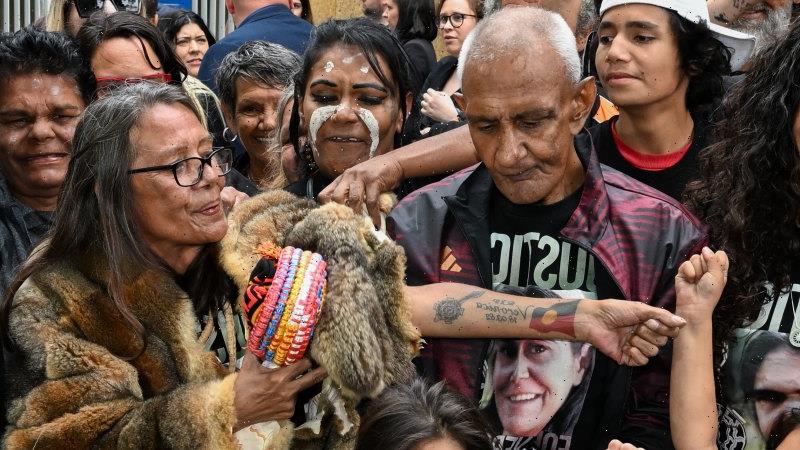Warning to Aboriginal and Torres Strait Islander readers: This story contains images and references to a deceased person.
The Victorian government and its former prison subcontractor face a potential record payout after a damning coroner’s report into the death of Indigenous woman Veronica Nelson in custody set the stage for her family to seek exemplary damages.
In the centre of the frame, flanked by supporters, are Nelson’s partner, Percy Lovett, and mother, Aunty Donna Nelson.Credit:Joe Armao
Nelson’s family is already in talks with the Corrections Department and Correct Care, which was yesterday referred to prosecutors by coroner Simon McGregor, to negotiate a settlement over Nelson’s death at Dame Phyllis Frost Centre in January 2020.
McGregor handed down his inquest findings on Monday, labelling the bail laws that put Nelson in jail as a “complete and unmitigated disaster”.
Victoria’s present bail laws were passed in 2018 in response to the Bourke Street massacre, which was carried out by a violent offender, who was on bail at the time.
The coroner’s report into Nelson’s death has paved the way for significant changes to the way Indigenous Victorians are treated by the criminal justice system.
McGregor, who was brought to tears during a four-hour-long reading of his findings, took aim at a litany of systemic failures within the criminal justice, health and corrections systems he said led to Nelson’s preventable death in inhumane and degrading circumstances.
Taking aim at the failure of the government to implement the recommendations of the Royal Commission into Aboriginal Deaths in Custody, McGregor said if this had been done 30 years ago, Nelson would still be alive today.
He said from the time of her arrest on December 30, 2019, to her death four days later at a women’s prison, Nelson was culturally isolated and her human rights repeatedly breached.
“Veronica was loved and respected by those who knew her. Yet Veronica, while alone in a cell at the Dame Phyllis Frost Centre, passed away after begging for assistance for several of the last hours of her life,” McGregor said.
Veronica Nelson.
“She was found the next morning on the floor of a cell in a prison built on the lands of the Wurundjeri and Bunurong people.
“That Veronica was separated from her family, community, culture and Country at the time of her passing is a devastating and demoralising circumstance.”
Nelson was arrested on Spencer Street on December 30, 2019, and taken to a nearby police station for questioning on suspicion of shoplifting. But instead of being released on bail, she was transferred to Melbourne Magistrates’ Court where she was placed on remand until a court date weeks later.
Over the following two days, she made 49 calls for help over the prison’s intercom while heroin withdrawal and an undiagnosed medical condition ravaged her body.
She was found dead in her cell on January 2, 2020, lying in the fetal position. Ambulance officers believe she had been dead for some time.
An autopsy found Nelson had undiagnosed Wilkie’s syndrome, a rare but potentially life-threatening gastrointestinal condition.
McGregor referred the actions of Correct Care Australasia to the Director of Public Prosecution for investigation.
“I also find that Justice Health failed to ensure that Correct Care Australia delivered a standard of health … and this failing causally contributed to her passing,” McGregor said.
“Veronica’s death was preventable.”
Attorney-General Jaclyn Symes thanked the coroner and said the government would carefully consider his recommendations.
“We know we need to do more in relation to criminal justice reform, including bail reform, and that work is continuing,” she said.
More to come.
Images contained in this story were released to the media with permission from the family. Crisis support run by Aboriginal and Torres Strait Islander people, contact 13YARN (13 92 76).
The Morning Edition newsletter is our guide to the day’s most important and interesting stories, analysis and insights. Sign up here.
Most Viewed in Politics
From our partners
Source: Read Full Article







